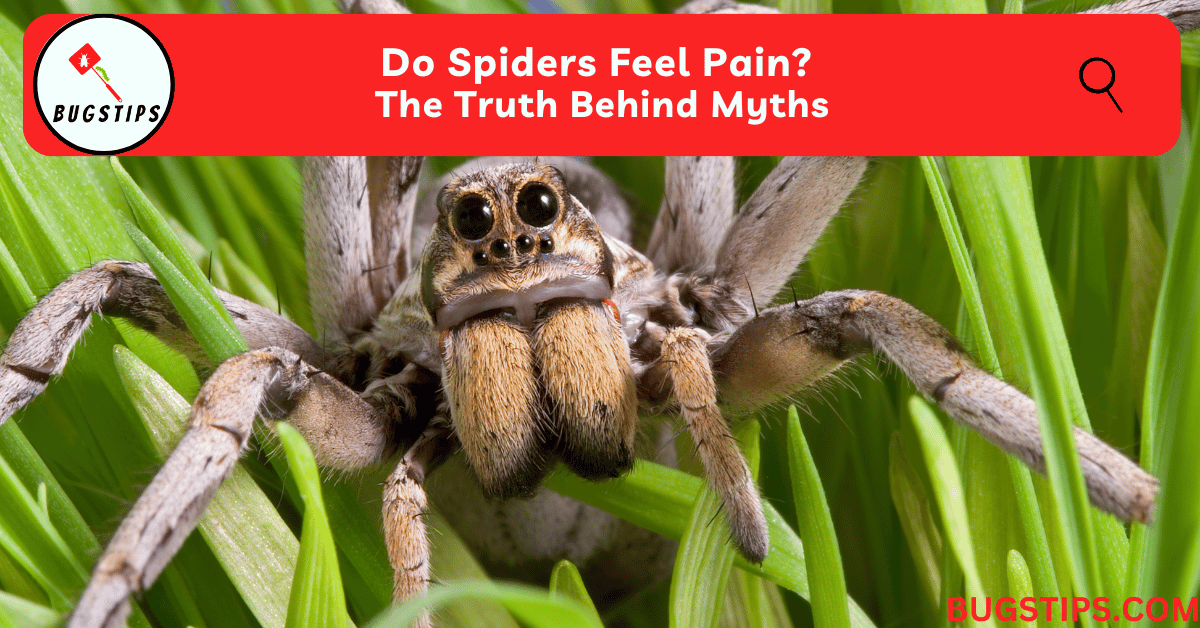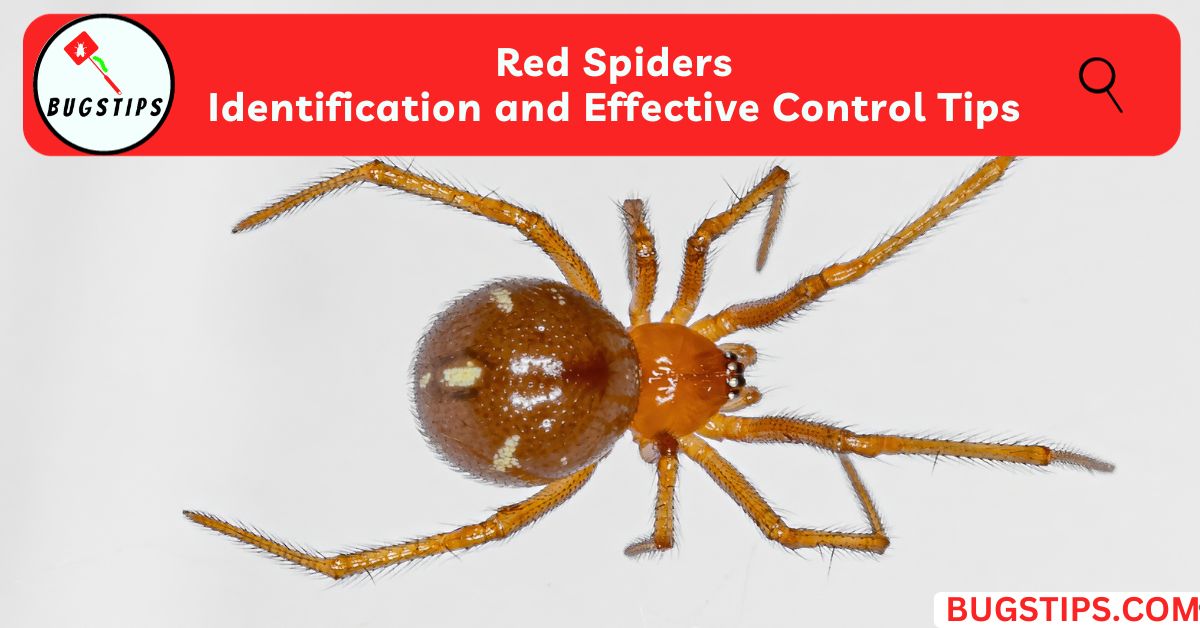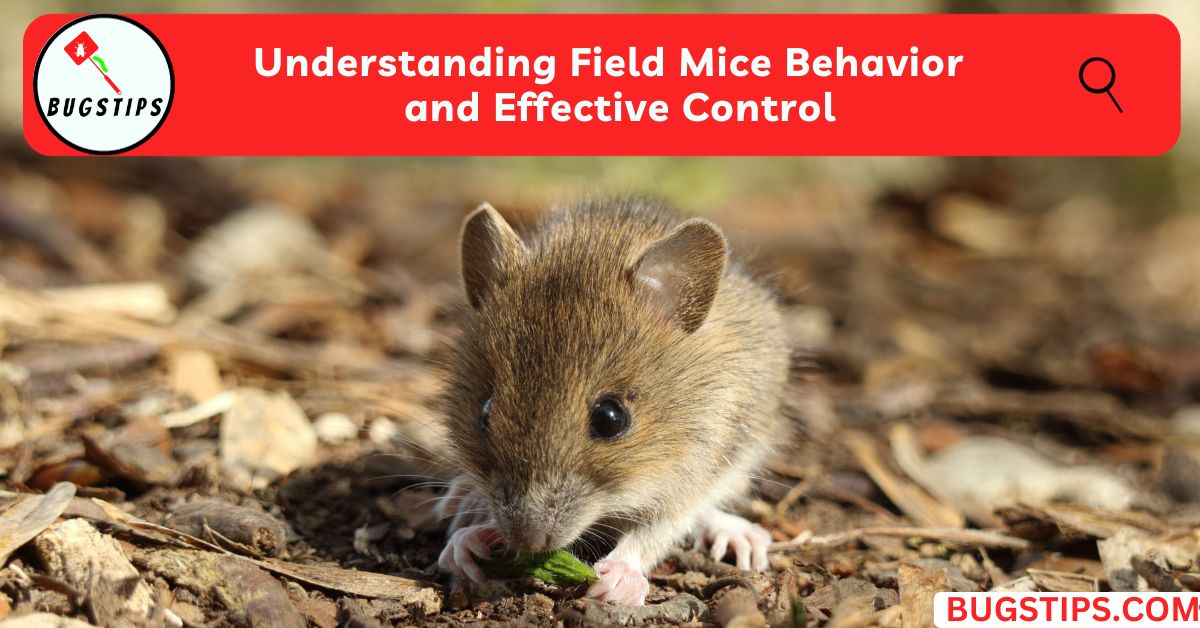This post may contain affiliate links which means as an Amazon Associate, this site may earn a small commission on qualified purchases made through links at no extra cost to you. Learn more on Affiliate Disclosure
Do spiders feel pain? This is a question that has intrigued many people for a long time. Spiders, with their unique characteristics and behaviors, have always been a subject of curiosity and fascination.
Whether spiders can experience pain or not has been a topic of debate for many years.
In this article, we will delve into the world of spiders and explore the concept of spider pain. We will examine the anatomy of spider sensory systems, the spider’s response to harm, and the myths that surround spider pain.
Additionally, we will also explore whether spiders can experience emotional suffering. So, if you’re curious to know more about whether spiders feel pain or not, read on.
Anatomy of Spider Sensory Systems
Spiders have unique parts in their bodies that help them sense and understand the things around them. These parts are called sensory organs, and they are very interesting.
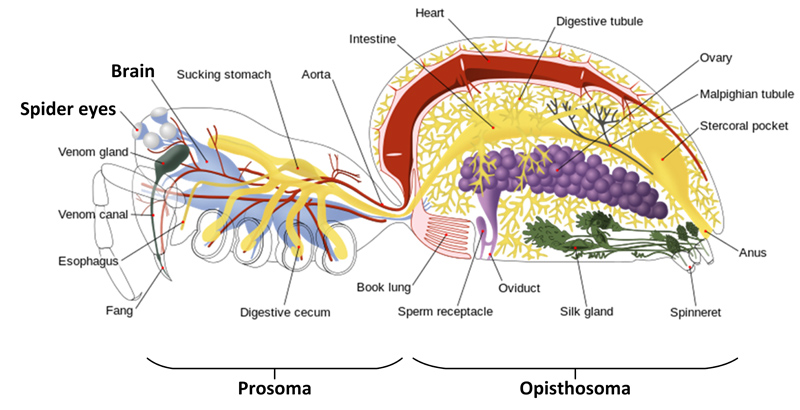
Let’s learn more about them and how they help spiders feel things.
Spider Sensory Organs
- Spiders have an interesting nervous system that helps them react quickly to their surroundings. Instead of having a centralized nervous system like humans do, spiders have many clusters of nerve cells called ganglia spread all over their bodies.
- This allows them to process information and react quickly to things in their environment.
- Mechanoreceptors are special sensors on the spider’s body, especially its legs.
- These sensors detect physical changes in the environment like touch or vibrations and give the spider important information about what’s happening around them.
- Chemoreceptors are sensors located on the spider’s appendages and mouthparts that can detect chemicals in the air.
- This ability helps spiders find food, identify potential mates, and avoid predators.
- Trichobothria are special hairs on the spider’s body that can detect even the slightest movements in the air.
- They help spiders sense changes in air pressure, which is helpful for detecting prey and defending against potential threats.
Spiders have amazing anatomy that allows them to sense their environment and react to different things. By perceiving touch, heat, and cold, spiders can adapt to their surroundings and stay alive.
Their sensory systems are crucial to their survival because they help them navigate their environment and respond to different stimuli.
Related Article – Can a Spider Die from Falling? 9 Surprising Facts
Do Spiders Feel Pain? Understanding Pain in Invertebrates
Pain is usually connected with animals that have complex nervous systems, like mammals. But for spiders, who are invertebrates, the question of whether they feel pain is more complex.
As explained above spiders have a different kind of nervous system that is not centralized like that of mammals. They have ganglia spread throughout their bodies that help them process information and react without a brain.
Although spiders have sensory structures to detect things like touch and chemicals, we don’t fully understand if they can experience pain like humans.
Pain involves many things like physical sensations, emotions, and thinking. Spiders might not have the same complexity in their nervous system to feel pain as we do.
Researchers are still studying how spiders and other invertebrates experience pain. Some studies suggest that spiders can respond to harmful things, but it’s not clear if they really feel pain like humans.
Spiders might have reflexes to survive that seem in pain, but it’s hard to know for sure.
Related Article – Can Spiders Swim? A Fascinating Look
The Spider’s Response to Harm
Spiders have developed unique ways to survive and respond to dangerous situations. Although their reactions may seem like pain, it’s important to understand how their senses work.
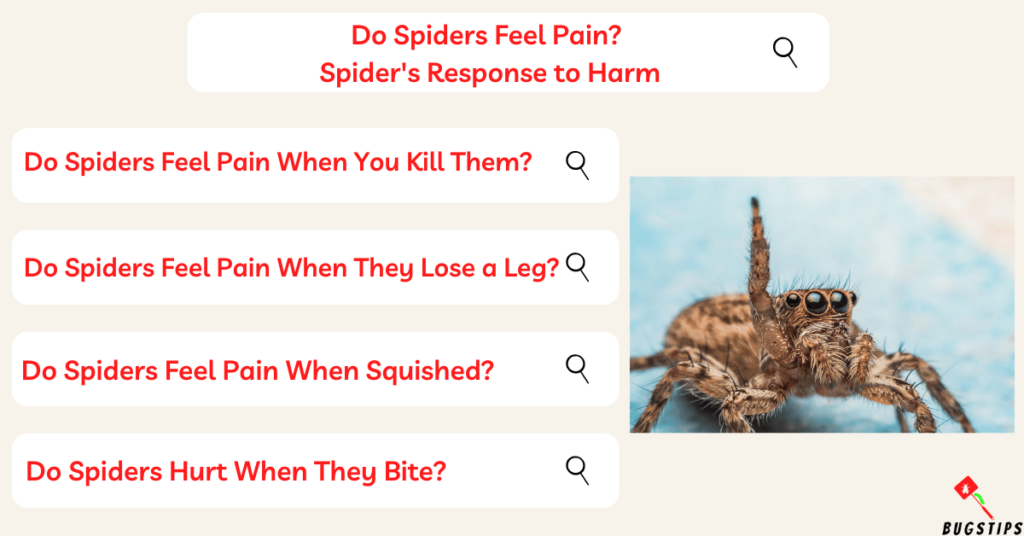
Here we’ll look at various situations related to spider harm and examine how they might respond. By understanding these scenarios, we can learn more about how spiders sense things and what they might experience.
Do Spiders Feel Pain When You Kill Them?
When it comes to killing a spider, it’s unlikely that they experience pain in the same way humans do. Scientific evidence suggests that spiders don’t have the same level of complexity in their nervous system to have a subjective experience of pain.
Although their sensory systems can detect harmful stimuli, their reactions are more likely reflexive responses driven by survival instincts.
Do Spiders Feel Pain When They Lose a Leg?
The question of whether spiders feel pain when they lose a leg is not fully understood. Studies have shown that spiders are capable of regenerating lost limbs, and they can continue to function normally even if they lose one or more legs. However, it’s unclear if they experience pain during the process of leg loss and regrowth.
Some scientists believe that spiders may experience pain when they lose a leg, while others believe that the process may not be painful.
Spiders have sensory structures that can detect harmful stimuli, and they have been observed to groom and attend to their injured limbs, which could be interpreted as evidence of pain.
Do Spiders Feel Pain When Squished?
When a spider is squished, its sensory receptors detect intense pressure and potentially harmful stimuli. Spiders may react with defensive behaviors or try to escape from the perceived threat.
However, these reactions are more likely reflexive responses to protect themselves rather than a conscious experience of pain.
While the spider’s sensory systems can detect harmful stimuli, they may not experience pain in the same way humans do.
Do Spiders Hurt When They Bite?
It’s not clear whether spiders feel pain when they bite. Spiders have sensory structures in their mouthparts that can detect the texture of the surface being bitten, but it’s uncertain if they experience pain during the process.
Some studies suggest that spiders may not feel pain from their own bites due to specific neurotransmitters that suppress pain signals in their nervous system.
Related Article – Are Woodlouse Spiders Poisonous?
However, spiders may feel discomfort or irritation from their own bites if they accidentally bite themselves or if something interferes with the normal functioning of their mouthparts.
Spider Web Maintenance and Pain
Spider webs are complex structures that spiders construct with incredible precision and care. They serve multiple purposes, such as trapping prey and providing shelter.
The process of web building is a complex behavior that involves specialized sensory perception, but it is unclear if it involves pain.
Here we will explore spider web maintenance and investigate whether spiders experience pain during this process.
Related Article – What Happens When You Destroy Spider Webs?
The Intricate Process of Spider Web Building
Spider web building is a remarkable process that showcases the spider’s incredible engineering skills. Spiders produce silk from specialized glands and use different spinning techniques to create various types of silk threads.
They then use their legs and body movements to construct intricate patterns, forming a complex web structure.
During the web-building process, spiders display intricate behaviors and sensory coordination. They rely on touch, tension, and other sensory cues to guide them in creating each thread and connecting it to the web’s framework.
This intricate process highlights the remarkable abilities of spiders and the importance of their sensory systems in web construction.
Exploring Spider’s Perception of Web Maintenance
Despite the significant time and energy spiders invest in building and maintaining their webs, it remains unclear whether they experience pain during web maintenance.
Web maintenance tasks include repairing damaged threads, removing debris, and ensuring the web remains functional.
Studies suggest that spiders have specialized sensory organs, particularly mechanoreceptors, that allow them to sense vibrations and changes in tension within their webs. These sensory cues provide valuable information about the web’s condition, allowing spiders to detect damage or prey entrapment.
However, the current scientific understanding of pain perception during web maintenance is limited.
Pain, as we perceive it, involves a complex interplay of sensory inputs, emotional responses, and cognitive processing, which may be beyond the capabilities of spiders’ neurobiology.
It is more likely that spiders’ responses to web damage are driven by instinctual behaviors aimed at maintaining the functionality of their webs rather than experiencing pain as humans do.
You May Also Like – Spiders in Car: How to Get Spiders Out of Your Car
Do Spiders Experience Emotional Suffering?
Emotions are complex mental states that are integral to the human experience. However, the question of whether spiders experience emotions and emotional suffering is an intriguing and complex one.
Let’s explore this topic in-depth and address common questions regarding spiders and their emotional capacities.
Do Spiders Feel Fear?
When we talk about fear, it is an emotional response that we associate with danger or threat.
While spiders do exhibit behaviors that may seem like they are experiencing fear, it is important to understand that their reactions are more likely to be driven by their survival instincts and programmed behaviors.
Spiders have developed defense mechanisms and strategies to protect themselves from harm, such as retreating or displaying aggressive behaviors.
These behaviors are more likely to be instinctual reactions rather than a conscious experience of fear, as we humans understand it.
Do Spiders Feel Love?
Love is a complex emotion that humans experience. But when it comes to spiders, their behaviors related to mating and reproduction may seem similar to what we associate with love, such as courtship rituals and mate selection.
However, these behaviors are primarily driven by their natural instincts and reproductive strategies, rather than a conscious emotional experience.
Spiders have evolved unique behaviors and strategies to find suitable mates and increase their chances of reproducing. These behaviors are more likely to be driven by biological programming and instinct, rather than a conscious emotional experience of love.
Therefore, it is unlikely that spiders feel love in the same way that humans do.
Myths About Spider Pain
Myths and misconceptions often surround the topic of spider pain, leading to misunderstandings and fears.
Let’s explore and debunk some common myths related to spider pain perception to gain a clearer understanding of spiders.
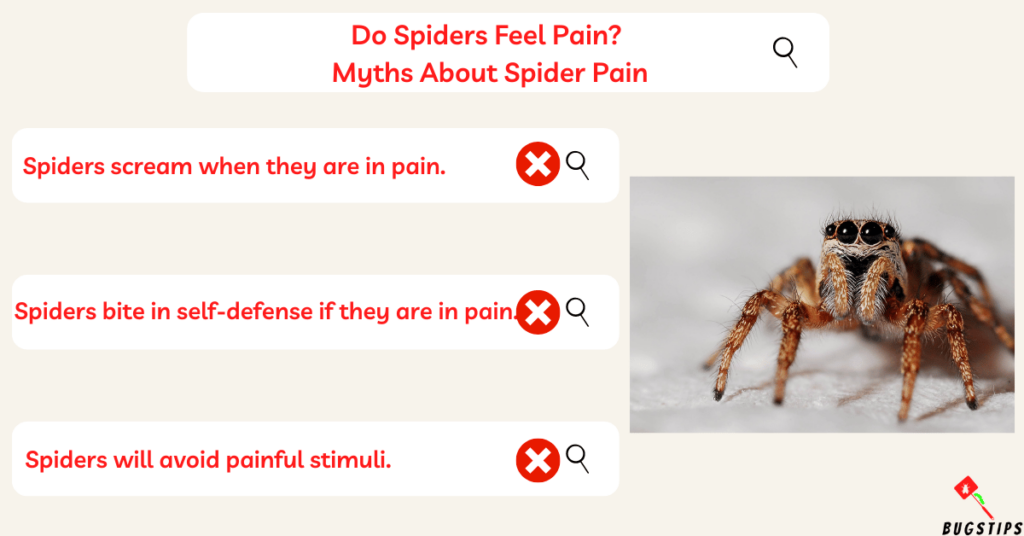
Myth 1: Spiders scream when they are in pain.
One common myth surrounding spiders is that they scream when they are in pain. However, this is entirely untrue. Spiders lack the necessary anatomical structures, such as vocal cords, to produce sounds like humans or other animals do.
Therefore, it is biologically impossible for spiders to scream as a response to pain or any other stimulus.
Related Article – Do Spiders Make Noise? 13 Fascinating Facts
Myth 2: Spiders will bite in self-defense if they are in pain.
Another misconception is that spiders will bite in self-defense when they are in pain.
While spiders may bite in certain situations, such as when they feel threatened or cornered, their bites are primarily driven by defense mechanisms or hunting strategies rather than a direct response to experiencing pain.
Biting is a natural part of their behavior and serves various purposes, including immobilizing prey or deterring potential predators.
Myth 3: Spiders will avoid painful stimuli.
Contrary to the belief that spiders will actively avoid painful stimuli, their behavior suggests otherwise.
Spiders, like other organisms, have evolved various mechanisms to detect and respond to potential threats or harmful stimuli in their environment.
While they may display avoidance behaviors towards certain stimuli, it is important to note that their responses are primarily driven by survival instincts rather than a conscious understanding of pain.
By debunking these myths about spiders, we can see how important it is to base our knowledge on scientific research and evidence. It's essential to have an open mind and seek out factual information when it comes to understanding spider behavior and pain perception. Believing in myths can lead to misunderstandings and fear of spiders, which is unnecessary and unwarranted. By relying on accurate information, we can appreciate these fascinating creatures and learn more about their unique adaptations and behaviors.
Final Thoughts
Many people have wondered if spiders feel pain, and scientists have studied spider anatomy, sensory systems, and reactions to harmful stimuli to gain insight into their experiences.
While spiders respond to harmful situations, these reactions are mostly driven by their instincts to survive, rather than feeling pain like humans do. As we learn more about spiders, it’s important to respect their unique biology and appreciate their role in the natural world.
We hope this informative article has answered your questions about spider pain perception and dispelled common myths surrounding this topic.
FAQs
Do spiders have nerves?
Yes, spiders have a nervous system. Their nervous system consists of a brain located in their cephalothorax and ganglia, which are clusters of nerve cells distributed throughout their body.
Do spiders have emotions?
No, they don’t. While spiders exhibit behaviors that may seem like emotions, such as courtship and defensive responses, these actions are mainly driven by their instincts and reproductive strategies. Spider behavior is primarily biological and instinctual rather than emotional.
Do spiders feel pain when they are attacked by predators?
No, spiders do not experience pain like humans. Their defensive responses to predators are driven by instinctual survival mechanisms, not the conscious experience of pain.
Do spiders feel pain when they get trapped in spider webs?
No, spiders do not feel pain when they get trapped in spider webs. Spider webs are an extension of their sensory system, and they perceive it as a sensory signal rather than pain. When a spider gets trapped, it will try to free itself or assess the situation to determine if it has caught prey or encountered a potential threat.
Resources – (for further reading)
Encyclopedia Britannica – Nervous system and senses – Spider
National Institutes of Health (.gov) – The morphology of spider sensilla. II. Chemoreceptors
ScienceDirect – Trichobothria – an overview

